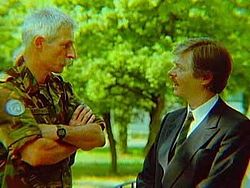Joris Voorhoeve | |
|---|---|
 Voorhoeve in 2014 | |
| Member of the Council of State [Status] | |
| In office 1 December 1999 –1 January 2011 | |
| Vice President | Herman Tjeenk Willink |
| Minister of Defence | |
| In office 22 August 1994 –3 August 1998 | |
| Prime Minister | Wim Kok |
| Preceded by | Relus ter Beek |
| Succeeded by | Frank de Grave |
| Minister for Netherlands Antilles and Aruba Affairs | |
| In office 22 August 1994 –3 August 1998 | |
| Prime Minister | Wim Kok |
| Preceded by | Ruud Lubbers |
| Succeeded by | Bram Peper Interior and Kingdom Relations |
| Leader of the People's Party for Freedom and Democracy | |
| In office 15 December 1986 –30 April 1990 | |
| Deputy | See list
|
| Preceded by | Rudolf de Korte |
| Succeeded by | Frits Bolkestein |
| Parliamentary leader in the House of Representatives | |
| In office 9 July 1986 –30 April 1990 | |
| Preceded by | Ed Nijpels |
| Succeeded by | Frits Bolkestein |
| Parliamentary group | People's Party for Freedom and Democracy |
| Member of the House of Representatives | |
| In office 19 May 1998 –1 December 1999 | |
| In office 16 September 1982 –10 January 1991 | |
| Parliamentary group | People's Party for Freedom and Democracy |
| Personal details | |
| Born | Joris Jacob Clemens Voorhoeve 22 December 1945 The Hague,Netherlands |
| Political party | Democrats 66 (from 2009) |
| Other political affiliations | People's Party for Freedom and Democracy (1975–2010) Democrats 66 (1969–1971) |
| Spouse | Judith Jaffe (m. 1976) |
| Children | Alex Voorhoeve [2] |
| Residence(s) | The Hague, Netherlands |
| Alma mater | Leiden University (B.Soc.Sc., MSSc) Wageningen University (BEc, B.Eng, MEng) Paul H. Nitze School (BA, MA, PhD) |
| Occupation | Politician · Diplomat · Civil servant · Political scientist · Researcher · Nonprofit director · Lobbyist · Activist · Author · Professor |
Joris Jacob Clemens Voorhoeve (born 22 December 1945) is a retired Dutch politician, diplomat of the People's Party for Freedom and Democracy (VVD) and political scientist.


